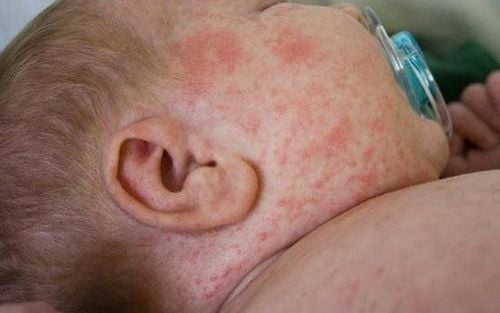The phenomenon of a gurgling stomach in newborns is common in the early stages after birth and can make parents worry. So, is this phenomenon dangerous, and what are its causes and treatments? Let's find the answers through the article below.
1. Causes of a Gurgling Stomach in Newborns
Newborns who frequently have gurgling or rumbling stomachs may experience air trapped in the folds of the intestines or other parts of the digestive tract. Common causes of a gurgling stomach in newborns include:
1.1 Issues with the Mother's Diet
For breastfeeding infants, breast milk is the main source of nutrition. Whatever the mother eats, the baby will receive the nutrients from those foods through the milk. Therefore, if the mother eats strange foods, too much fatty food, protein, spicy foods, raw dishes, or foods that are contaminated or spoiled, it can affect the quality of the milk, causing the baby to have a gurgling stomach and diarrhea.
1.2 Improper Feeding
Many newborns are bottle-fed exclusively or in combination with breastfeeding. If the bottle's nipple does not fit the baby's mouth properly, or if the feeding technique is incorrect, such as milk flow being too slow or too fast, the baby may swallow a lot of air, leading to a gurgling stomach. Additionally, if formula milk is prepared incorrectly or feeding equipment is not properly sterilized, it can also cause the baby’s stomach to gurgle.
1.3 Lactose Intolerance
Lactose is a sugar found in milk and dairy products. For various reasons, if the baby has to be fed formula too early, their body may not produce enough enzymes to digest lactose. This undigested lactose accumulates in the intestines, causing a gurgling stomach.
1.4 Other Causes
Other causes of a gurgling stomach in newborns may include:
Infection with E.coli, Shigella, Salmonella, or viruses from habits such as thumb-sucking, toe-sucking, or using unsterilized pacifiers. These bacteria and viruses can overwhelm beneficial gut bacteria, causing digestive disturbances and diarrhea.
Antibiotic use: Side effects may include a gurgling stomach, constipation, and diarrhea.
2. Signs of a Gurgling Stomach in Newborns
Recognizing the signs of a gurgling stomach in newborns helps parents take timely intervention measures and care for their baby appropriately. Typical signs of this condition include:
- The baby’s stomach makes gurgling sounds.
- Frequent spitting up and vomiting.
- The baby cries a lot, especially at night, and refuses to breastfeed.
- The baby has diarrhea and frequent bowel movements.
- The baby experiences bloating, flatulence, and burping.
- The gurgling stomach phenomenon in newborns can resolve in a day or last for up to a week.
3. What Should Parents Do When Newborns Have a Gurgling Stomach?
When a baby has a gurgling stomach with symptoms of bloating and indigestion, parents should take the following steps:
- Change the baby’s feeding position: If the baby’s gurgling stomach is due to swallowing too much air, adjust the feeding position accordingly. If the baby is crying while feeding and you hear gurgling sounds, quickly change the feeding position. You can place the baby with their chin resting on your shoulder and gently pat their back to help them burp. Alternatively, lay the baby on their back and gently bend their knees continuously. If bottle-feeding, ensure the nipple fits well in the baby’s mouth to prevent swallowing excess air.
- Change the mother’s diet: If the baby has a gurgling stomach, frequent flatulence, and diarrhea, the mother should pay attention to her daily diet. For breastfeeding mothers, avoid foods that cause bloating and gas, such as cabbage, broccoli, soy products, tomatoes, citrus fruits, fatty foods, and spicy dishes. Include more fiber in your daily diet.
- Switch to a different formula: If the gurgling stomach is due to formula milk, try changing to a different type. Opt for formulas that are gentle, high in fiber, easy to digest, low in protein, and have components similar to breast milk, with little or no lactose. Additionally, follow the correct formula preparation instructions, and always sterilize bottles, nipples, and other feeding equipment before feeding.
- Consult a pediatric specialist if the condition persists: If you follow these steps but the baby’s gurgling stomach does not improve significantly, take the baby to a pediatric specialist for advice and treatment.
4. Preventing a Gurgling Stomach in Newborns
A prolonged gurgling stomach and frequent diarrhea can imbalance the baby’s digestive system and reduce nutrient absorption. Therefore, parents should know how to prevent gurgling stomachs in newborns to ensure they stay healthy:
- Exclusively breastfeed in the early years: If the mother has low milk supply, feed the baby frequently to ensure they are full, which also stimulates more milk production.
- Use formula correctly when necessary: If formula feeding is necessary, research the ingredients, amount, and preparation method. When purchasing formula and dairy products, read the nutritional content to choose products with low lactose levels, aiding easier digestion.
- Follow proper formula preparation and feeding techniques: Prepare formula 5-10 minutes before feeding, keeping the bottle upright to reduce air bubbles. Gently stir the formula to avoid creating bubbles.
- Eat a balanced diet while breastfeeding: Mothers should choose low-fat, non-spicy foods. Consume plenty of vegetables, fruits, and at least 2 liters of water per day.
The phenomenon of a gurgling stomach in newborns is due to increased bowel movements for various reasons. Mothers should learn how to prevent and manage this condition to help their baby stay healthy and improve digestion.
Please dial HOTLINE for more information or register for an appointment HERE. Download MyVinmec app to make appointments faster and to manage your bookings easily.













